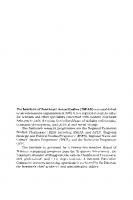Democratization in Southeast and East Asia 9813055316, 9747100347
333 17 46MB
English Pages [284] Year 1997
Recommend Papers

- Author / Uploaded
- Anek Laothamatas
File loading please wait...
Citation preview
The Institute of Southeast Asian Studies (ISEAS) was established as an autonomous organization in 1968. It is a regional research centre for scholars and other specialists concerned with modem Southeast Asia, particularly the many~faceLed problems of stability and security, economic development, and political and social change. The Institute's research programmes are the Regional Economic Studies Programme (RES) including ASEAN and APEC, Regional Strategic and Political Studies Programme (RSPS), Regional Social and Cultural Studies Programme (RSCS), and the Indochina Programme (ICP). The Institute is governed by a twenty-two-member Board of Trustees comprising nominees from the Singapore Government, the National University of Singapore, the various Chambers of Commerce, and professional and civic organizations. A ten-man Executive Committee oversees day-to-day operations, it is chaired by the Director, the Institute's chief academic and administrative officer.
SLLHWORM BOOKS *
y
Trasvin Publications L.P. Thailand
-
Institute of Southeast Asian Studies S.fnga,oore
Published by Institute of Southeast Asian Studies Hong Mui Keng Terrace Pasir Paniang Road Singapore 119596
Internet e-matt: [email protected] World Wide Web: http://wwv\niseas.ac.sg/pub.htm1
A11 rights reserved. No part of this publication may be reproduced, stored in
a retrieval system, or transmitted in any form or by any means, electronic, mechanical, photocopying, recording or otherwise, without the prior permission of the Institute of Southeast Asian Studies.
© 1997 Institute of Southeast Asian Studies, Singapore First published in Thailand in 1997 by Silkworm Books 64/1 Sridonchai Road
Chiang Mai 50100 Thailand E-mail: [email protected]. World Wide Web: http://www.muang.com/si]I"od
However, the honeymoon period between the capitalists and the intelligentsia, including the student movement, ended quite quickly when the latter began to be critical of capitalist ideology and embraced socialism as their guiding principle. The rise of socialism was in large part made possible by the victory of socialist movements in neighbouring countries, namely, Vietnam, Laos and Cambodia. Fearing that their vital economic interests were being threatened, the capitalists abandoned the progressive elements in the coalition and instead reembraced the pro-status quo, pro-capitalist state apparatuses, namely, the military and the civilian bureaucracies. Thai politics following the 1973 uprising thus became deeply polarized, with the progressives being pitted against the conservative state-eapitMist eoalition- The political contention between the two ideological camps was very tense. Alleging that the Left was out to destroy the three na.tional pillars Nation, Religion, and King - the conservatives in a concerted move mobilized bureaucratic, business, as well as religious groups for the crushing of the Leftists during 1975-76. The extensive mobilization of conservative forces against the Leftists culminated in the massacre of the progressive forces in the bloody October 1976 coup. Such was the end of the fledgling Thai democracy in this round. To summarize, the democratic breakthrough during this period was made possible by the weakening of military power, the expansion of the middle class and the growing indep evidence of the local capitalists. The opposition forces converged on anti-military sentiment. Democracy served as the most useful political ideal in the formation of the alliance between the capitalists and other progressive forces. However, the alliance was short-lived, because of an ideological rift within it, the capitalist forces perceived the socialist-inclined progressives as a threat not only to themselves but also to the dominant institutions such as the monarchy, the military, the bureaucracy
and the religious establishment. There were no credible democratic institutions at the time to serve as a forum where differences could be reconciled, as political parties and the parliamentary system were too weak. Democracy suffered a severe reversal. The 19'7'7-79 Period: Coping with Dissidents The most significant political legacy of the 1973-76 period was the proliferation of various social and political movements, organized along
6. The fbfak.éng of Tha.i D@rmooQ'r:,c;g
151
both ideological and professional lines, be they labour, farmers, students, teachers, and so on. Despite the massacre, the Left still had considerable strength, particularly in the universities. So they decided to right back by joining the then Communist Party of Thailand (CPT) following the 1976 coup which installed a repressive regime led by ultra-Rightist Prime Minister Thanin Kraivixian. The progressive forces, whose main component was the people of the middle strata, joined the CPT in its armed struggle against the state largely to maintain their political idealism and agenda - which was basically to topple the pro~capitalist, military-dominated state power. The massive exodus of intellectuals, students, and labour leaders (who were a crucial part of the middle class) into the jungle not only legitimized the communist insurgent group but also caused a big rift among the ruling conservatives themselves. The new members of the CPT did initially boost its image which, in turn, caused state legitimacy to erode. Furthermore, the increasing strength of the communists placed a greater burden and pressure on the military and civilian security officials, who had to deal directly with the problem, which was the suppression of the communists. The suppression did not seem to succeed as communist influence continued to rise. As a result, the hardliner policy of Prime Minister Thanin, which was viewed as being responsible for the increasing loss of state legitimacy, began to lose the support of the military and the bureaucracy. The capitalists who feared a take-over of state power by the CPT also began to see Thanin's policy as counter-productive. Thanin's days were numbered, and a military coup engineered by a group of young military officers --.. the Young Turks .---- took place in October 1977, after an attempted coup six months earlier. General Kriangsak Chomanan, then the military supreme commander, was installed as Prime Minister. Kriangsak moved swiftly to appease the young military officers, the more progressive wing in the capitalist camp, and some members of the intelligentsia and the middle class by initiating a policy of
"national re









